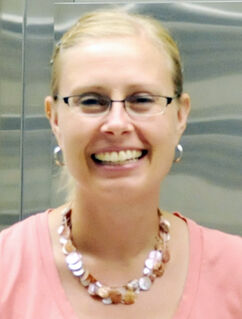SOLON- Nutritionist Kelly Crossley of Solon schools has started a school garden before. In Independence, she began a Farm to School chapter with money from the Iowa Department of Agriculture and Land Stewardship (IDALS).
Last year, she announced an IDALS grant that started the Lakeview garden and is organizing a group to keep the garden (and other school agriculture projects) growing. Crossley collected $350 from IDALS as part of their Farm to School program and another $200 from the Lakeview PTO to start the garden. She admitted much of the food grown did not end up in school lunches, but Farm to School (F2S) is about more than school gardens.
Crossley’s still working to make fresh produce a mainstay of school menus, but she wants to kick start a F2S chapter in Solon for more than just the good eats.
Of Iowa’s 348 school districts, only 16 F2S chapters exist. Solon’s would be the 17th and local food experts say the sky is the limit for what schools can do with F2S, beyond school garden plantings and field trips to farms.
F2S is a multi-faceted national program from the USDA that was started with money from the 2008 Farm Bill. Most school projects bring local food and produce into lunches. Many schools also use IDALS money to start gardens or bring agricultural and nutritional programming into classrooms.
The F2S organizer in Iowa City Community School District (ICCSD) is Brandi Janssen. She’s the president of Field to Family, a non-profit that works to connect?citizens to their food and promote a local sustainable food system.
Bringing local food into schools can be a challenge. Janssen said there are some food items that are great for school kitchens and there are some that don’t work.
“When schools are feeding several thousand kids each day, it is not feasible to cut whole lettuce,” she said. But some items work really well. Iowa City schools have used local watermelons for student lunches but still struggle to find local producers with enough produce to feed the whole district.
“It takes time to figure out what products will work best in a school environment,” she said.
Fifteen school gardens are in production in ICCSD and Janssen said more are planned, “on-site food production might be the most exciting part, where students are engaged in producing some of the food that is served.”
But she added, “a robust local procurement system is essential” for kids to have more access to fresh, healthy foods. Sourcing food locally can be difficult but is a way to “help create markets for the local farmers who feed us,” Janssen said.
Last fall, at the Iowa City Farmer’s Market “Kids Day,” West High students organized a booth and worked with younger students to sell produce gathered from school gardens around the district.
Janssen said food-bearing permaculture like orchards, perennials and berries would be a welcome addition to any school but there are many paths that can connect Iowa farms to Solon schools.
She predicted great things for Crossley’s chapter in Solon, “I can’t wait to see what she comes up with,” adding, “Kelly’s experience at Independence is going to serve her well at Solon.”
The first step for Solon is to establish a core group of supporters and Crossley is hoping to drum up interest from teachers, students, parents, community members and local growers with a March 25 meeting at the school administration conference room.
Crossley said in Independence, F2S funding sent the seventh grade on a day-long field trip to three farms; a dairy, an apple orchard and a local farm that provided community-supported agriculture (CSA).
“At the time we were purchasing fresh green beans from the CSA for school lunches and apples from the orchard, so the students actually got to see where their food was coming from,” she said.
Independence students took a district-wide student vote on the name of the school garden and made signs and business cards for the school garden with the help of high school graphic design students.
Laura Dowd, director of Local Foods Connection in Iowa City, believes that agriculture should be included in all school curricula because she said, “children need to know the source of the food they eat. Food not only maintains our lives, but determines our quality of life as well.”
Dowd said that if Solon teachers’ lessons on food production and nutrition were reinforced in the cafeteria with farm-fresh foods on their menus, “children will have a deeper understanding of the subject, because agriculture will become alive and exciting.”
Dowd added that Iowans especially should take care to understand the value of the land and our important responsibility as its stewards.
Local Foods Connection works to bring fresh produce to low-income families, connecting them to farmers and CSAs.
A Feb. 26 meeting for the Solon Farm to School program was snowed out and rescheduled for March 25 at 6:30 p.m. in the central administration office.
Planting seeds
B. Adam Burke
March 19, 2013

Planting seeds
